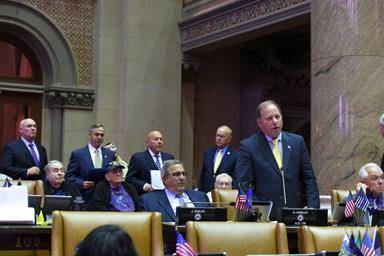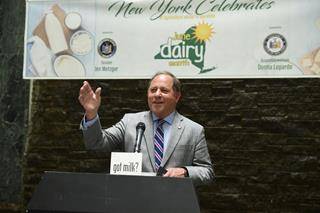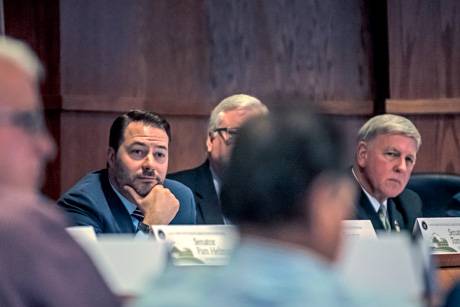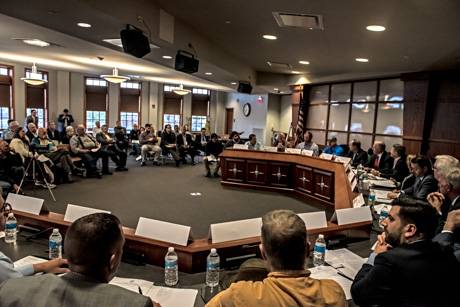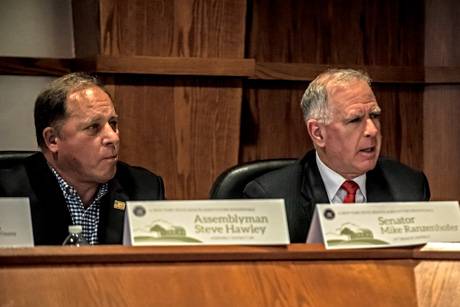As odd as it might seem to most Western New Yorkers, Sen. Rob Ortt told a group of farmers, farmworkers, and farm supporters gathered for a roundtable discussion at Batavia City Hall on Thursday, stopping the Farmworkers Fair Labor Practices Act from destroying Upstate farms may come down to the reasonableness of Gov. Andrew Cuomo.
"His signature will have to be on this bill and then it will be his bill," Ortt said. "He will be the one with the legacy of what this bill will do to the largest business sector in the state. I think that will give him pause. I know in the past not many of us have thought of him as the voice of reason in Albany but as unusual as it might be, that might just be the case (with the farm labor bill)."
Assemblyman Steve Hawley said the idea of Cuomo doing the right thing for Upstate residents isn't as far-fetched as it sounds. He pointed to the recent fight over providing college benefits to Gold Star families. When Assembly Democrats rejected the proposal, Cuomo found a way to shift funds and get it done, Hawley said.
"The guy who is purportedly governor of the entire state and represents all of us could just be the key to all of this," Hawley said.
Ortt convened the roundtable to discuss the farm labor bill, he said, because Western New York farmers are not being heard by members of the Legislature because there are no hearings being held in this part of the state.
The bill, if passed, would give farmworkers the right to join labor unions, establish an eight-hour workday and a 40-hour work week, establish regulations for housing, and establish rules for workers' compensation.
Area farmers say the changes to the law would devastate them. Area farmworkers say the bill would diminish their incomes. Both say a 40-hour work week, in particular, would mean H2A workers, who can work anywhere in the nation, would stop coming to New York.
The Senate sponsor of the bill is Sen. Jessica Ramos, a first-termer from Queens who now chairs the Senate Labor Committee. Ramos visited Genesee County a couple of weeks ago and met with farmers and farmworkers in a meeting room at Genesee Community College and then at a Torrey Farms facility in Elba, where 350 farmworkers were on hand to talk with her. Both events were supposed to be closed to the press but The Batavian was at the event at Torrey Farms (see story and video here).
Sen. Michael Ranzehofer, who hosted the visit, said that while most of the conversations were in Spanish, to an individual, old, young, men, women, there was a consistent theme: the workers don't want to be restricted to only 40 hours a week.
That's a message that didn't seem to sway Ramos, Ranzenhofer indicated.
In a recent article, Ramos (who canceled a scheduled interview with The Batavian and has not rescheduled it) told the Queens Eagle that arguments that New York farmers would not be able to compete in the global market place of commodities if the bill passes are unpersuasive.
“Farmers understand that there’s merit in treating their workers well, but of course like everything else there are great employers and there are very poor employers,” Ramos told the Eagle. “This bill is really about codifying rights that exist for every other worker in New York.”
Ramos cited her own experience in her parents native country of Colombia for supporting the bill.
“Farming is not foreign to me. When I’d go to Colombia as a little girl, I spent a lot of time picking coffee,” she said, adding that she has long advocated for labor rights. “That’s the reason I’m there. I’m not trying to do this from a perch down in Queens. I really honestly care to understand everyone’s perspective.”
Sen. Chris Jacobs observed that Ramos, "seems very set in her ways."
For local farmers, who represent them, however, Ramos, and Cathy Nolan, who is carrying the bill in the Assembly, are two out-of-touch Downstate legislators who have no farms, farmers, or farmworkers in their districts and have no business crafting agriculture policy.
"We've got to realize that we're less than 1 percent of the population in New York," said Kim Zuber, representing Monroe County Farm Bureau. "People don't really understand what we do and they don't understand the cost of doing business."
A couple of the farmers pointed out that they already comply with some provisions of the bill, especially when it comes to housing. Most farmers provide housing, including paid utilities, for their migrant workers. If their workers have an H2A visa, the Health Department regularly inspects farmworker housing and the farmers are held to pretty high standards.
"I just took my son to his new apartment in Buffalo," said one farmer, "and as I looked at it, I found at least a half dozen violations. I'm not saying it was a bad place, but an H2A worker would never be allowed in that house and I'm not exaggerating."
Sen. Rich Funke was pretty blunt.
"This is the single greatest attack on Upstate New York by Downstate politicians since I’ve been in office," Funke said.
In an interview after the meeting, Ortt expanded on his thoughts about the potential role Cuomo might have in protecting farmers and farmworkers from this legislation. He noted that, whether you support the effort or not, Cuomo has invested heavily in Western New York economic development. He clearly wants economic development in Upstate to be his lasting legacy and this bill, with its potential to devastate the Upstate economy, could undo all of the governor's efforts to bring industry back to Upstate.
"If all of the prognostications are true, this bill will kill the Upstate economy," Ortt said. "Does he want, after all the money and all the press and all the trips Upstate, for that to be his legacy? You know how it goes, everybody remembers the governor. The senators and the assemblymen come and go, but the governor is the one people remember when it comes to these long-term impacts. Does he want people to remember that it was the Cuomo administration and Governor Cuomo who signed this bill into law?
We asked Ortt if Ramos, given her attempts to avoid the media on her trip here and her unwillingness to answer questions about her bill, is really an honest broker with this legislation?
"Well, anytime you say 'no press' on a bill this big, it begs the question, 'why?' " Ortt said. "Why the secrecy? I mean, truthfully, what is she afraid of? To me, that's a red flag right there. Why no press? But I think what's also interesting is that at the first hearing in Morrisville she was there two hours late and left an hour early. So how much is she really listening?
As for the bill itself, we asked about the right for farmworkers to collectively bargain, especially given Ortt's statement earlier in the evening suggesting some sort of compromise could be reached on the bill. The Constitution guarantees the right to assembly, the right to free association, so shouldn't workers have the right to form unions?
"No one actually objects to their right to organize or collectively bargain," Ortt said. "Now that's coming from farmers. They told me that is not their objection, it's (that) we're also setting the conditions that might be negotiable and we're setting them in state law. For the farmer, he's saying, 'Well, not only are you allowing them to collectively bargain but then you're also setting several parameters that might be negotiable and you're taking that off the table because you're putting it in state law."
The main objection farmers have to the bill, Ortt said, is the eight-hour workday and 40-hour work week.
"To be competitive, you can't limit yourself to an eight-hour day," Ortt said. "The overtime really affects your bottom line. So they're saying maybe 60 hours for the hourly, and anything over 60 or 65 then you could do time and a half, and don't set a daily limit. Maybe those are points of negotiation. I don't know and I hate to negotiate against myself.
"If Senator Ramos or Senator Metzger or whomever, if they're willing to make a movement that's great, we can have a conversation," Ortt added later. "I haven't seen as of yet a sign that they're willing to make any move. So, you know, as the old saying goes, you know, 'don't negotiate against yourself.' "
